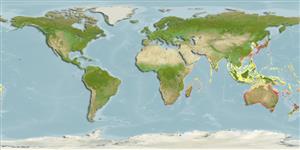Common names from other countries
Issue
Nomen dubium in Muraenidae according to Böhlke & Smith 2002:155.
Environment: milieu / climate zone / depth range / distribution range
Ecologia
marinhas; estuarina associadas(os) a recifes; intervalo de profundidade ? - 30 m (Ref. 5323). Tropical
Western Indian Ocean: southern Mozambique to the Cape of Good Hope; also Maldives. Western Pacific: Australia, Lord Howe Island, and New Zealand. Possibly occurring in Japan.
Tamanho / Peso / Idade
Maturity: Lm ? range ? - ? cm
Max length : 150 cm TL macho/indeterminado; (Ref. 5323)
Vértebras: 140 - 142. Brownish grey dorsally, creamy white ventrally. Wide dusky margin on median fins.
Inhabits coastal waters and estuaries. Demersal on rocky reefs (Ref. 9563). Flesh highly esteemed.
Life cycle and mating behavior
Maturidade | Reprodução | Desova | Ovos | Fecundidade | Larvas
Castle, P.H.J., 1986. Congridae. p. 161-165. In M.M. Smith and P.C. Heemstra (eds.) Smiths' sea fishes. Springer-Verlag, Berlin. (Ref. 5323)
Categoria na Lista Vermelha da IUCN (Ref. 130435)
CITES (Ref. 128078)
Not Evaluated
Ameaça para o homem
Traumatogenic (Ref. 5323)
Utilização humana
Mais informação
ReferênciasAquaculturaPerfil para aquaculturaEstirpesGenéticaElectrophoresesHereditariedadeDoençasProcessamentoMass conversion
Ferramentas
Relatórios especiais
Descarregue XML
Fontes da internet
Estimates based on models
Preferred temperature (Ref.
115969): 15.5 - 26.6, mean 22.5 (based on 765 cells).
Phylogenetic diversity index (Ref.
82804): PD
50 = 0.5000 [Uniqueness, from 0.5 = low to 2.0 = high].
Bayesian length-weight: a=0.00389 (0.00180 - 0.00842), b=3.12 (2.94 - 3.30), in cm Total Length, based on all LWR estimates for this body shape (Ref.
93245).
Nível Trófico (Ref.
69278): 3.5 ±0.6 se; based on diet studies.
Resiliência (Ref.
120179): Baixo, tempo mínimo de duplicação da população 4,5 - 14 anos (Preliminary K or Fecundity.).
Fishing Vulnerability (Ref.
59153): Very high vulnerability (90 of 100).
